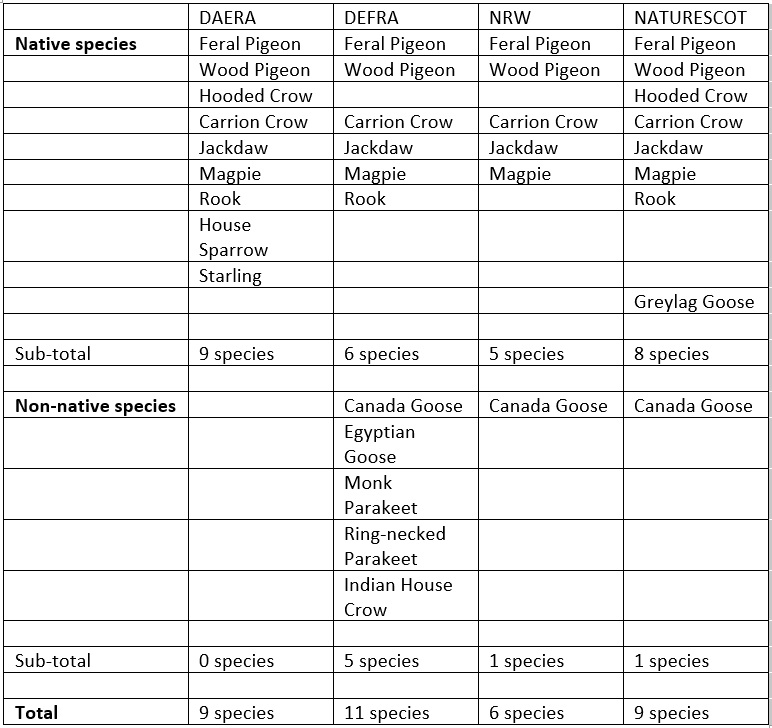The state of general licences across the UK nations
Wild Justice’s first legal challenge was of general licences in England. General licences are used by statutory agencies to authorise the killing of what might be called ‘pest’ species – although we object to that as a blanket term.
All wild birds are protected by law but there are circumstances under which they can be killed – for example to protect human health, crops or endangered species. If you think that a particular Robin, to take a daft example, is a threat to nature conservation interests then you can apply for a specific licence to kill it. However, you will have to explain the problem that you claim is caused by this Robin and say why non-lethal means of solving the problem won’t work.
The general licences streamline, or circumvent, that process for a small number of species which really can cause such problems, for which non-lethal solutions might not work and, let’s be honest, the licensing authorities don’t want to have to deal with lots of individual applications, they’d rather issue a general licence on their website. It is easy to see that a general licence published on a website may be less well scrutinised by its users than a piece of paper sent to them personally in the post.
Wild Justice has described the general licensing system as being too often ‘the casual licensing of casual killing’ of birds. Our legal challenges, supported by you, have led to rapid reform of the general licences across the UK with Northern Ireland making the most recent changes in reaction to a Wild Justice legal challenge. Here are some headline changes to the licensing system since we started our challenges:
- the species that can be killed have been reduced in number – for example all gull species are now removed from these licences
- the species that can be killed for alleged conservation purposes have been greatly reduced
- the species which are alleged to benefit from the use of the conservation licences have, in some areas, been better defined and listed for the first time – the lists are pretty bizarre but the task now is to make them better
- in Wales, the circumstances under which the killing of some species to conserve certain other species can be lawful is only to protect eggs and chicks which theoretically limits the time of year duruing which the licence can be relied
- the places the licences apply now exclude SSSIs etc where special permission is needed
- the killing of species to protect gamebirds has been limited
- the wording has improved (but not enough)
Here are three tables which set out the current position for the three different categories of general licence in each of the four UK nations.
Table 1 – human health and safety

Northern Ireland is clearly out of line with the other UK nations in listing so many native species. We think Scotland (NatureScot) and Wales (NRW) have probably got it about right.
Table 2 – serious damage to crops/livestock

Northern Ireland is again out of line – we’d like to see House Sparrow and Starling removed from the Northern Ireland list as they have been from those of other UK nations. We’re pretty unconvinced of the necessity of having general licences which authorise the killing of Magpies or Jackdaws, in particular, to protect crops or livestock.
Table 3 – nature conservation

We have concentrated our actions on the conservation lists so far. Once Jay, Jackdaw and Magpie are removed from these lists across the UK then we will take a breath and regard these lists as almost fit for purpose. We know of no conservation organisations which routinely kill these three species for conservation reasons, and the science does not support their inclusion in such lists. Remember, removing them from the general licences merely means that an individual must apply, with details, for a specific licence, which may be granted or refused after the application has been scrutinised, it isn’t an end to all lethal control.
Why does Wild Justice care about the general licences?
- we care about all wildlife and these are wildlife-killing licences
- we believe that the licences have been largely the product of prejudice and not science
- the conditions which restrict the use of these licences are often flouted
- the licences are not enforced or monitored by the authorities
- they aren’t even understood by those who think they are using them properly
- the licences allow, in theory, unlimited killing of species which are natural parts of our countryside
- sometimes the methods used to kill birds under these licences are not humane
These general licences have been a neglected area of wildlife law and policy for too long – we’re proud of the fact that we have shone a bright light on them, and that greater scrutiny, backed by legal action, has resulted in rapid change and improvement. Though there’s still some way to go…
Wild Justice is a not-for-profit organisation set up by Chris Packham, Ruth Tingay and Mark Avery. We are entirely dependent on donations. To support our work – click here. To hear more about our campaigns and legal cases subscribe to our free newsletter – click here.
